LATEST NEWS
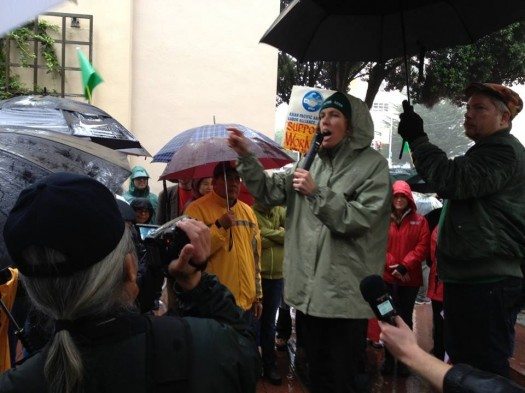

Yesterday, some 22,000 surgical and X-ray technicians, custodians, servers, cooks and other workers at nine University of California campuses and all of U.C.’s medical centers began a one-day unfair labor practice strike over what they say is intimidation and harassment of workers who took part in an earlier strike over patient safety in May.
AFSCME Local 3299 President Kathryn Lybarger said:
Our members have both the legal right and moral responsibility to stand up for the safety of the students and patients we serve. By attempting to silence workers, U.C. hasn’t just repeatedly broken the law—it has willfully endangered all who come to UC to learn, to heal and to build a better life for their families.
As it did in the May action, before today’s walkout began, Local 3299 took measures to ensure that patient care needs would be met, including keeping many key workers on the job and forming a Patient Protection Task Force to ensure that unforeseen emergency medical needs at U.C.
» Read more about: U.C. Health Care Employees Walk the Line »


Better bring some identification — and not just any identification, official though it may be — if you plan to vote in Republican-controlled states. However, if you contribute tens of millions of dollars to sway an election on Republicans’ behalf, the party will fight to keep your identity a secret.
Consider, for instance, what happened to some attempting to participate in this month’s elections in Texas. The New York Times reported that “Judge Sandra Watts was stopped while trying to vote because the name on her photo ID, the same one she had used for voter registration and identification of 52 years, did not exactly match her name in the official voter rolls.” Both Democratic state Sen. Wendy Davis and Republican Attorney General Greg Abbott — the front-runners in next year’s gubernatorial contest — encountered the same obstacle. As did Jim Wright, the 90-year-old former speaker of the U.S.


In a remarkable act of courage and solidarity with the next generation, last week Boeing workers in Seattle soundly rejected corporate extortion, by voting down a contract which traded job guarantees for concessions that would severely erode the pay and benefits of younger workers. In doing so, the members of the Machinists are risking their jobs to save an America built on the middle class.
The dramatic fight of fast-food workers for a minimal living wage, risking their jobs every time they take a day off to demonstrate, is one end of a corporate economy based on low wages, no benefits and no unions. That corporate strategy, aimed at maximizing profits, is destroying America’s middle class, wrecking the engine that powered the U.S. economy.
On the other end of the middle class are workers like Boeing’s, who have fought together through their union for the good pay, pensions, health benefits and job security that characterized the increased prosperity and lowered income inequality of America in much of the second half of the 20th Century.
» Read more about: Machinists Say No to Cutting Next Generation’s Benefits »
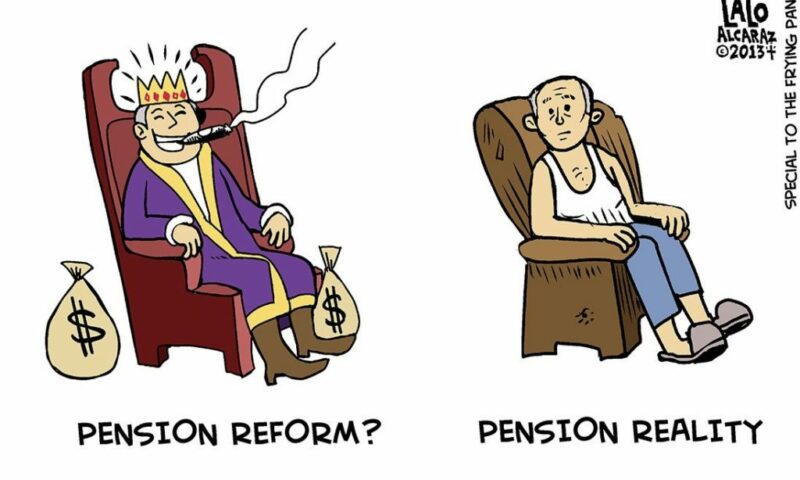
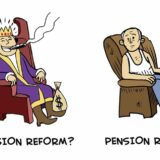
It’s official: America has entered a retirement crisis. Or, as Forbes understatedly put it, “the greatest retirement crisis in the history of the world.”
And, while the causes are manifold — the demographic bulge of baby boomers leaving the fulltime workforce; greater worker longevity; the disastrous, 30-year shift from traditional defined benefit pensions to costly 401(k)-style plans — most experts agree that the national retirement implosion has gone critical, with an estimated 75 percent of Americans who are nearing retirement age having less than $27,000 in their retirement accounts.
Even John C. Bogle, the founder of the $2 trillion mutual fund and 401(k) behemoth Vanguard Group, recently admitted that the system of retirement plans that rely on 401(k)s is broken.
“[401(k)s were] designed as a thrift plan, and it doesn’t work as a retirement plan,” Bogle declared.
So it is with some irony that a Texas hedge fund billionaire/former Enron trader and a politically ambitious Northern California mayor have teamed up to cripple one of the few parts of the retirement story that still works — California’s public-sector pension system.
» Read more about: My Body Isn’t 40 Anymore: Three Faces of Retirement »
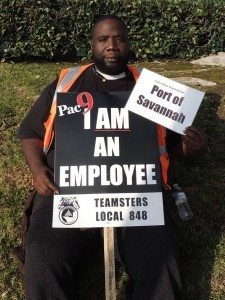
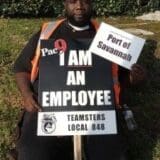
This afternoon about 100 port drivers will return to their jobs after staging a 36-hour walkout. The unfair labor practices strike, which was supported by the International Brotherhood of Teamsters Local 848, was called to protest what drivers say is employer retaliation for trying to organize a union. The companies targeted in and around Carson were Green Fleet Systems, Pac 9 Transportation and American Logistics International. The drivers claim they’ve been intimidated and harassed for their organizing efforts – employer actions that are against U.S. labor law.
In addition to the retaliation allegations lodged with the National Labor Relations Board, wage-theft charges have been filed with the state against Pac 9 for misclassifying its employee drivers as “independent contractors” – a ploy that has allegedly allowed the company to deduct its business expenses from the drivers’ salaries.
The striking port drivers did not walk the line alone – Teamsters from the Toll Group,
» Read more about: Port Truckers Strike to End This Afternoon »


Walmart just reported shrinking sales for a third straight quarter. What’s going on? Explained William S. Simon, the CEO of Walmart, referring to the company’s customers, “their income is going down while food costs are not. Gas and energy prices, while they’re abating, I think they’re still eating up a big piece of the customer’s budget.”
Walmart’s CEO gets it. Most of Walmart’s customers are still in the Great Recession, grappling with stagnant or declining pay. So, naturally, Walmart’s sales are dropping.
But what Walmart’s CEO doesn’t get is that a large portion of Walmart’s customers are lower-wage workers who are working at places like … Walmart. And Walmart, not incidentally, refuses to raise its median wage (including its army of part-timers) of $8.80 an hour.
Walmart isn’t your average mom-and-pop operation. It’s the largest employer in America. As such, it’s the trendsetter for millions of other employers of low-wage workers.
Last week’s Twitter IPO triggered stories about “tech culture’s” impact on San Francisco and the broader society. It made me ask: is there really a culture of tech outside the workplace and, if so, what is it? More importantly, does labeling popular activities among young workers as “tech culture” create divisions among people who otherwise could be working together to solve social problems? Many (including myself) have identified the term with a libertarian political philosophy, hostility to unions and overwhelming white and Asian-American workers under-40 without kids. It is also identified with the rise of artisan coffees and foods, wine bars, upscale restaurants and the now legendary $4 toast that led the Courage Campaign to launch a petition to Mayor Lee regarding the city’s rising costs.
But associating “tech culture” with the politics of the tech elite, as occurred after Facebook’s Mark Zuckerberg’s founded a pro-immigration reform group that ran opportunistic ads supporting the Keystone XL Pipeline and drilling in the Arctic National Wildlife Refuge,


(Randy Shaw is the editor of BeyondChron and author of The Activist’s Handbook, Second Edition. This post first appeared November 14 on BeyondChron and is republished with permission.)
Last week’s Twitter IPO triggered stories about “tech culture’s” impact on San Francisco and the broader society. It made me ask: is there really a culture of tech outside the workplace and, if so, what is it? More importantly, does labeling popular activities among young workers as “tech culture” create divisions among people who otherwise could be working together to solve social problems? Many (including myself) have identified the term with a libertarian political philosophy, hostility to unions and overwhelming white and Asian-American workers under-40 without kids. It is also identified with the rise of artisan coffees and foods, wine bars, upscale restaurants and the now legendary $4 toast that led the Courage Campaign to launch a petition to Mayor Lee regarding the city’s rising costs.


Author and documentary film co-producer (Wal-Mart: The High Cost of Low Price, Iraq for Sale) Kerry Candaele’s newest work records the transformative power that Ludwig van Beethoven’s Ninth Symphony has had upon the lives of four people. These stories took him to a dozen countries on five continents, part of a journey of discovery about one of music’s greatest achievements. In Candaele’s new documentary, Following the Ninth: In the Footsteps of Beethoven’s Final Symphony, the Ninth’s “Ode to Joy” choral finale emerges as a soundtrack for social justice and world brotherhood.
In this film, which Bill Moyers calls “beautiful and powerful,” Candaele recounts the struggles of rebellious students like Feng Congde at Tiananmen Square, who played the “Ode to Joy” over loudspeakers as they faced the tanks,
» Read more about: Interview With the Director of ‘Following the Ninth’ »
For generations, Americans have relied on public service workers to inspect the food we eat. In fact, one major concern of the recent government shutdown was that food inspectors would be furloughed, endangering or shutting down the food supply chain across the country.
American public institutions have a long track record of keeping our food disease-free. Yet as this service is increasingly outsourced to for-profit corporations, it is leading to repeated oversight failures that have caused illness and even death. And too often, the for-profit entities that are now responsible for keeping our food safe have conflicts of interest that encourage them to rubber-stamp inspections rather than ensure our food is safe.
The Department of Agriculture’s Food Safety Inspection Service (FSIS) has proposed a “Modernization of Poultry Inspection.” But “modernization” is just public relations babble for removing USDA inspectors from poultry lines and letting companies police themselves.
» Read more about: Removing USDA Poultry Inspectors: What Does the Fox Say? »


Twenty-seven port truck drivers walked into the Rancho Dominguez offices of Total Transportation Services, Inc. (TTSI) Thursday and presented their employer with a petition. Their demand was simple: to be properly recognized as employees. TTSI is one of the largest port trucking companies in the twin ports of Los Angeles and Long Beach. TTSI’s business model – like the vast majority of port trucking companies in the country – relies on misclassifying its drivers as independent contractors.
When companies like TTSI misclassify their employees, they not only deprive the public of much-needed revenue by avoiding taxes, they also deprive workers of hard-earned wages by deducting business expenses like lease payments and fuel from drivers’ paychecks.
As TTSI driver Jose Rosales states, “Some weeks we aren’t even breaking even. How can I build a future for my family this way?”
Rosales and his fellow TTSI drivers who delivered yesterday’s petition are also seeking recourse through the California Division of Labor Standards Enforcement (DLSE),
» Read more about: TTSI’s Port Drivers Demand to Be Treated as Employees »
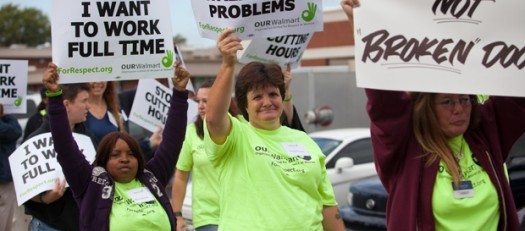

On December 5, as part of its 20th anniversary celebration, the L.A. Alliance for a New Economy will honor OUR Walmart, an organization determined to transform conditions at the world’s largest retailer. Frying Pan News recently asked Walmart employee Martha Sellers, who has worked at the company’s Paramount store for 10 years, to reflect on her role in one of the most ambitious social justice efforts of our time.
Frying Pan News: If you could sit down for a one-on-one conversation with Walmart CEO Mike Duke, what would you say?
Martha Sellers: Explain to me why you cannot afford to pay us a living wage when it is proven you make mega bucks. Why?
You spend your money on all these things but your associates. Why?
You spend money on PR and opening more stores when the stores that are already open are not doing well.
» Read more about: Fear Is No Option: Walmart Associate Martha Sellers »


This morning L.A. Observed disclosed the death of its business editor and writer, Mark Lacter. LAO editor-in-chief Kevin Roderick reported that Lacter’s “wife, the author Laura Levine, told me that Mark suffered a stroke yesterday and could not survive the bleeding on his brain. He was 59 and died at Ronald Reagan UCLA Medical Center.”
A former Los Angeles Business Journal editor, Lacter was a regular commentator on radio station KPCC and also published in Los Angeles magazine. In 2005, he was named by the Society of Professional Journalists as Distinguished Journalist of the Year
Although Lacter would often infuriate Frying Pan News readers with his swipes at unions, he also railed against developers who were manipulating the government’s EB-5 visa program and, more notably, against the outlandish inequality between Los Angeles’ haves and have-nots.


This morning L.A. Observed disclosed the death of its business editor and writer, Mark Lacter. LAO editor-in-chief Kevin Roderick reported that Lacter’s “wife, the author Laura Levine, told me that Mark suffered a stroke yesterday and could not survive the bleeding on his brain. He was 59 and died at Ronald Reagan UCLA Medical Center.”
A former Los Angeles Business Journal editor, Lacter was a regular commentator on radio station KPCC and also published in Los Angeles magazine. In 2005, he was named by the Society of Professional Journalists as Distinguished Journalist of the Year
Although Lacter would often infuriate Frying Pan News readers with his swipes at unions, he also railed against developers who were manipulating the government’s EB-5 visa program and, more notably, against the outlandish inequality between Los Angeles’ haves and have-nots.
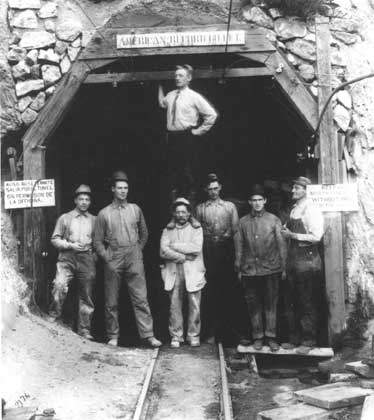
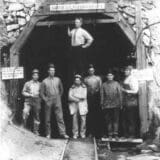
With all the hoopla about the centenary of the L.A. Aqueduct last week, I looked again at an article on a related piece of our history – the birth of public power. The early 20th Century was an age not entirely unlike our own, with high levels of inequality and most of the wealth controlled by a powerful few. It was in this climate that Los Angeles’ labor unions and working class communities fought for a publicly owned energy utility, to be sold at cost.
Jeff Stansbury argued in a 2011 L.A. Times opinion piece that while the reformers of the day are often credited for bringing public power to the city, they had actually allied themselves with L.A.’s three private electric companies, which wanted to control the power that would be generated by the aqueduct’s hydroelectric plants. Meanwhile, the Central Labor Council, the International Brotherhood of Electrical Workers and other unions pushed for a citywide straw poll in 1911 that would come down on the side of municipal power for homes and businesses.
» Read more about: The Birth of a Public Utility, the Future of a City »


At the National Employment Law Project (NELP), where we advocate for low-wage and unemployed workers, some of our most inspiring moments have come from being involved in campaigns where labor and the community work together for greater economic justice.
The recent passage of AB 218 — Assemblymember Roger Dickinson’s “ban the box” bill — was a shining example of the labor movement working in alliance with the community to expand economic opportunity to people hardest hit by unemployment. The unions, led by the California Labor Federation and SEIU Local 1000, were an essential partner to the powerful coalition that organized with NELP for more than two years to provide a second chance to the one in five Californians with a criminal record who struggle to find work. In addition to our partners that co-sponsored and led the charge organizing in support of the bill – PICO California,
» Read more about: New Law Eases Job Barriers for Former Prisoners »


On Sunday, November 3, the Los Angeles Times ran a 429-word story, “Wal-Mart kicks off Christmas way early, helping to kill Black Friday,” on the retail giant’s plan to entice customers to do their Christmas shopping early by marking down prices weeks before the traditional day-after-Thanksgiving bargains. Providing Walmart with tens of thousands of dollars of free advertising, the story reported that “Deals include 36 percent savings on a JVC 42-inch LED television and 51 percent savings on a 10-inch Xelio tablet — at $299 for the TV and $49 for the tablet, those are the lowest tags Wal-Mart has ever put on those products.” Surely this is the kind of “news” that a Walmart PR executive drools over.
In contrast, the Times’ coverage of last Thursday’s anti-Walmart protest — one of the largest local civil disobedience actions in the company’s history — garnered a puny 163-word story,
» Read more about: Missing in Action: L.A. Times Coverage of Walmart Arrests »


RICHMOND, Calif. – In a run-down shopping center in the heart of this San Francisco Bay Area community, about a half dozen activists are plotting to turn the housing market on its head.
Their aim: stem home mortgage foreclosures and preserve neighborhoods in a city hit hard by the housing bust. But, this time, the activists have some unusual allies.
They have enlisted officials from the city of Richmond and beyond. They’re working alongside a group of investors who stand to make a profit if the plan works. And they’re advocating government seizures.
Wait - seizing private property? Profiting from neighborhood preservation? Is this the Bizarro World? Well, sort of. But the way the activists see it, they’ve hit upon an idea that’s so counterintuitive, it just might work.
That idea involves eminent domain, the power of government to take private property for public purposes.
» Read more about: Richmond Considers Saving Troubled Mortgages »


In addition to serving as Senior Fellow for Health Care for the Roosevelt Institute | Campus Network, I am the Executive Director for my campus’ Roosevelt chapter. A few weeks ago at our general body meeting, I asked the crowd whether they had been talking with their friends about the Affordable Care Act and what these conversations sounded like. Did they know the basics: that in January, most Americans will be expected to either carry at least minimal insurance or pay an opt-out penalty? Do they know that they will be able to stay on their parents’ insurance until they are 26, if they so choose? Have they compared the prices of different options available for young adults versus the penalty?
The question meant to take up the first 10 minutes of our meeting turned into a full 40-minute discussion. As we scarfed down our pizza in true hungry college-student fashion,
» Read more about: Obamacare: Millenials Want Facts, Not Politics »
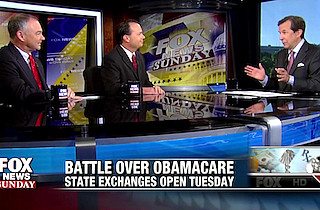

(Harold Pollack is the Helen Ross Professor of School of Social Service Administration at the University of Chicago. His post first appeared on The Nation‘s website and is republished with permission.) We’re six weeks into the implementation of one of the key provisions of the Affordable Care Act, the rollout of the healthcare marketplaces. It’s been a tough month, dominated by failures of rather astonishing proportions. But sooner or later, Healthcare.gov will work and Republican governors will grasp that bipartisan cooperation with the Obama administration is in their best interest. First, let’s acknowledge the failures. The most obvious occurred within the Obama administration itself, whose Department of Health and Human Services botched the launch of the online marketplace. For those of us who worked so hard over many years to secure passage of healthcare reform, this was humiliating. We argued for years that the individual and small-group insurance market required greater transparency,